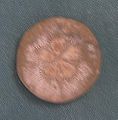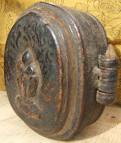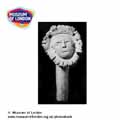
| Next | Previous | Index | Tellout Home |
12. White Stone
Revelation 2.17
"Whoever has ears, let them hear what the Spirit says to the churches. To the victorious one, I will give some of the hidden manna. I will also give that person a white stone with a new name written on it, known only to whoever receives it." (Revelation 2.17) ✞
Revelation White Stone
 Every Christian who overcomes will receive "Revelation's white stone" inscribed with a new name. In Rome, the great houses presented food and money every morning to their dependents. These sometimes received a "Tessera," a small white stone, or even a wooden or a metal token of a similar size as a one-cent U.S. coin or an English penny. It was a tally, giving free entry into the arena or a complimentary banquet meal. "Revelation's white stone" for Christians means that Christ grants them the spiritual rewards which only he can give. ✞
Every Christian who overcomes will receive "Revelation's white stone" inscribed with a new name. In Rome, the great houses presented food and money every morning to their dependents. These sometimes received a "Tessera," a small white stone, or even a wooden or a metal token of a similar size as a one-cent U.S. coin or an English penny. It was a tally, giving free entry into the arena or a complimentary banquet meal. "Revelation's white stone" for Christians means that Christ grants them the spiritual rewards which only he can give. ✞
Gladiator Stone
 Upon retiring, the Romans presented a white stone to a victorious swordsman or swordswoman with the letters 'S.P.' inscribed. These letters celebrated faithful service and stood for the Latin "spectatus," meaning "a man or woman of proven valor beyond a doubt, tested and esteemed." In the ancient Roman empire, a victorious gladiator was the most admired hero of all. Receiving a gladiator stone was one of the highest honors. The word "gladiator" came from the "gladius" sword they carried. Men and women gladiators sometimes appeared together in the stadium. ✞
Upon retiring, the Romans presented a white stone to a victorious swordsman or swordswoman with the letters 'S.P.' inscribed. These letters celebrated faithful service and stood for the Latin "spectatus," meaning "a man or woman of proven valor beyond a doubt, tested and esteemed." In the ancient Roman empire, a victorious gladiator was the most admired hero of all. Receiving a gladiator stone was one of the highest honors. The word "gladiator" came from the "gladius" sword they carried. Men and women gladiators sometimes appeared together in the stadium. ✞
Verona Coliseum
One such gladiatorial field at Verona in Italy still stands today, rebuilt as in Roman times. The coliseums are used today for entertainment, concerts, or other events. While we were on holiday near Verona, the famous singer Andrea Bocelli performed a coliseum show. Not only is he a very gifted singer but also a kind and generous Christian family man. Most gladiators however were former slaves or captives from wars, but some volunteers enlisted for the notoriety. They repeatedly fought until either killed or allowed to retire in case of a draw! The gladiator who had a specially illustrious career when they grew old were permitted an honorable retirement as well as a parting gift of a white gladiator stone. The game's master conferred special rights upon outstanding victors. A Revelation's white stone similarly confirms that the victorious follower will share in Jesus' reign and future glory. ✞
Gladiator Russell Crowe
 Christ calls Christians to be his gladiators. Like the movie gladiator Russell Crowe, they will rest with honor when they prove their bravery in life's battles. "Revelation's white stone" bears a new name, possibly "Jesus" or the phrase "Devout Christian." "The white stone" in this verse probably grants admission to messianic banquets. It is a mark of faithfulness and a job well done. What an honor that will be! ✞
Christ calls Christians to be his gladiators. Like the movie gladiator Russell Crowe, they will rest with honor when they prove their bravery in life's battles. "Revelation's white stone" bears a new name, possibly "Jesus" or the phrase "Devout Christian." "The white stone" in this verse probably grants admission to messianic banquets. It is a mark of faithfulness and a job well done. What an honor that will be! ✞
Stone Name Significance
 A white stone with a Roman general's name was considered a good luck charm in battle. An "amulet" in the ancient Roman world was a "talisman" or "good luck charm." This talisman could be in remembrance of someone special. The "Tessera" inscribed with the giver's initials could be wood, stone, or bone in ancient Rome and Greece. A white stone was also sometimes split in two as a friendship token. After that, the two halves guaranteed a warm welcome and safety when visiting the other's home or territory. Dr. William Barclay (1907-1978), an eminent Biblical scholar and historian, writes, "In the ancient world, a pleasant day was called a 'white day.'" Revelation's white stone was a delightful gift to receive! ✞
A white stone with a Roman general's name was considered a good luck charm in battle. An "amulet" in the ancient Roman world was a "talisman" or "good luck charm." This talisman could be in remembrance of someone special. The "Tessera" inscribed with the giver's initials could be wood, stone, or bone in ancient Rome and Greece. A white stone was also sometimes split in two as a friendship token. After that, the two halves guaranteed a warm welcome and safety when visiting the other's home or territory. Dr. William Barclay (1907-1978), an eminent Biblical scholar and historian, writes, "In the ancient world, a pleasant day was called a 'white day.'" Revelation's white stone was a delightful gift to receive! ✞
Sacred Name
 On the white stone, there was often a sacred name carved or written. , Some people believed that knowing a god's identification gave the bearer certain special powers. The deity's identity came with the ability to summon it to one's aid in difficult times. Revelation's white stone was doubly valuable if no one other than the owner knew the name inscribed upon it in ancient times. Here in Revelation, Jesus gives his faithful followers Revelation's white stone with a new name upon it, not as a good luck charm but bearing the secret and unique identity of Jesus himself. ✞
On the white stone, there was often a sacred name carved or written. , Some people believed that knowing a god's identification gave the bearer certain special powers. The deity's identity came with the ability to summon it to one's aid in difficult times. Revelation's white stone was doubly valuable if no one other than the owner knew the name inscribed upon it in ancient times. Here in Revelation, Jesus gives his faithful followers Revelation's white stone with a new name upon it, not as a good luck charm but bearing the secret and unique identity of Jesus himself. ✞
Jesus' Stone
 The gift of Jesus' white stone is a guarantee of a believer's eternal nourishment. John of Patmos is most likely saying in Revelation 2 that Jesus will give you Revelation's white stone as an amulet. "You did the same in your heathen days. You carried an 'object that protected you from trouble' with supernatural power, even with superstitious inscriptions on them like your heathen friends. You thought that they would keep you safe and protect you from harm. Now, you need nothing like that, for you are safe in life and death because you know 'the new name,' that is God's only true name, Jesus Christ." Revelation's white stone that Jesus gives provides entrance to the heavenly feast. Revelation's white stone may bear a secret new name until a believer enters heaven and the risen Christ's presence. ✞
The gift of Jesus' white stone is a guarantee of a believer's eternal nourishment. John of Patmos is most likely saying in Revelation 2 that Jesus will give you Revelation's white stone as an amulet. "You did the same in your heathen days. You carried an 'object that protected you from trouble' with supernatural power, even with superstitious inscriptions on them like your heathen friends. You thought that they would keep you safe and protect you from harm. Now, you need nothing like that, for you are safe in life and death because you know 'the new name,' that is God's only true name, Jesus Christ." Revelation's white stone that Jesus gives provides entrance to the heavenly feast. Revelation's white stone may bear a secret new name until a believer enters heaven and the risen Christ's presence. ✞
Two Words for New
 In Greek, the word used here for "new stone" is "kainos." There are, however, two words for "new." There is "neos," which means "new in time." A thing could be "neos," and yet exactly like any number of other stones. Another word for "new" is "kainos," meaning "new not only in time but also in quality for nothing like it has existed before." This new name is written on Revelation's white stone and indicates Jesus' complete and utter bond with a Christian like nothing before it. Jesus will give each believer a unique white stone that glistens like snow. "The white stone" is unusual because each Christian receives a unique name marked on it. The words "white" and "new" are characteristic of Revelation. ✞
In Greek, the word used here for "new stone" is "kainos." There are, however, two words for "new." There is "neos," which means "new in time." A thing could be "neos," and yet exactly like any number of other stones. Another word for "new" is "kainos," meaning "new not only in time but also in quality for nothing like it has existed before." This new name is written on Revelation's white stone and indicates Jesus' complete and utter bond with a Christian like nothing before it. Jesus will give each believer a unique white stone that glistens like snow. "The white stone" is unusual because each Christian receives a unique name marked on it. The words "white" and "new" are characteristic of Revelation. ✞
The Color White
 A British Biblical scholar R. H. Charles (1855-1931), writes, "white is the color and livery of heaven." The word "white" does not describe a dull, flat whiteness like ceiling paint but a glistening white like snow in the winter sun. The "white stone" had other meanings in that age. In a Greek court, it referred to a white pebble indicating acquittal or innocence. In an election, voters cast their lot with a small stone. The election stones referred back to the blessing or curse of the black and white Urim and Thummim, precious stones embedded in the high priest's breastplate. Exodus 28.15,30 instructed, "Fashion a breastpiece for making decisions." "Also put the Urim and the Thummim in the breastpiece, so they may be over Aaron's heart whenever he enters the Lord's presence. Thus Aaron will always bear the means of making decisions for the Israelites over his heart before the Lord." Revelation's white stone is both an emblem of sin's forgiveness and a reminder that God individually chooses Christians and loves them. ✞
A British Biblical scholar R. H. Charles (1855-1931), writes, "white is the color and livery of heaven." The word "white" does not describe a dull, flat whiteness like ceiling paint but a glistening white like snow in the winter sun. The "white stone" had other meanings in that age. In a Greek court, it referred to a white pebble indicating acquittal or innocence. In an election, voters cast their lot with a small stone. The election stones referred back to the blessing or curse of the black and white Urim and Thummim, precious stones embedded in the high priest's breastplate. Exodus 28.15,30 instructed, "Fashion a breastpiece for making decisions." "Also put the Urim and the Thummim in the breastpiece, so they may be over Aaron's heart whenever he enters the Lord's presence. Thus Aaron will always bear the means of making decisions for the Israelites over his heart before the Lord." Revelation's white stone is both an emblem of sin's forgiveness and a reminder that God individually chooses Christians and loves them. ✞
Name's Meaning
 Revelation's white stone is the evidence that God acquits a person and declares them worthy of eternal life. A person's Christian name, given in baptism, is likewise intended to represent their character. God gives us "new names" and new hearts when we follow him. "John," for example, means a "gift of God." "A new stone name" may reference the Christian's spiritual rebirth separate from but typically marked by baptism. "Revelation's white stone" may be an actual person! Perhaps the Risen Christ himself is given to his faithful ones with a new self, cleansed of all earthly stains and glistening with heavenly purity! ✞
Revelation's white stone is the evidence that God acquits a person and declares them worthy of eternal life. A person's Christian name, given in baptism, is likewise intended to represent their character. God gives us "new names" and new hearts when we follow him. "John," for example, means a "gift of God." "A new stone name" may reference the Christian's spiritual rebirth separate from but typically marked by baptism. "Revelation's white stone" may be an actual person! Perhaps the Risen Christ himself is given to his faithful ones with a new self, cleansed of all earthly stains and glistening with heavenly purity! ✞
Wall Mosaics
In court trials, a black Tessera determined guilt and a white one established innocence. The Tessera or the plural "tesserae" act as lots. After the Olympic Games, winners joined an honor parade and received a white stone bearing the winner's name. They were also provided a pension for the rest of their lives. A small square stone used in wall and floor mosaics is also called a "Tessera." "Tesserae" are little tablets made of stone or glass. The remains at Pompeii and Herculaneum revealed many fine examples. Mediterranean houses and churches in the Roman period used them widely. Tesserae mosaics also appeared as wall paintings, especially where candles were burning. The tiny colored glass or pottery pieces kept their bright colors in churches despite smoke and candle soot, which soon darkened and discolored an ordinary painting. They were also easy to clean. ✞
Hidden Manna
 We all need spiritual food in our lives. In this Revelation verse, Jesus says that he will give "hidden manna" for our spiritual needs. Exodus 16.4-5 describes the origins of "manna." "Then the Lord said to Moses, 'I will rain down heavenly bread for you. The people are to go out daily and gather enough for that day. In this way, I will test them and see whether they will follow my instructions. On the sixth day, they are to prepare what they bring in, twice as much as they gather on the other days." God provided "manna," which was a heavenly white bread-like substance. ✞
We all need spiritual food in our lives. In this Revelation verse, Jesus says that he will give "hidden manna" for our spiritual needs. Exodus 16.4-5 describes the origins of "manna." "Then the Lord said to Moses, 'I will rain down heavenly bread for you. The people are to go out daily and gather enough for that day. In this way, I will test them and see whether they will follow my instructions. On the sixth day, they are to prepare what they bring in, twice as much as they gather on the other days." God provided "manna," which was a heavenly white bread-like substance. ✞
What is it?
The Hebrew word for the wilderness manna or "mana" sounds like "What is it?" Exodus 16.14-15 describes it, "When the dew was gone, thin flakes like frost appeared on the desert floor. When the Israelites saw it, they said to each other, 'What is it?' For they did not know what it was." Moses said to them, 'It is the bread the Lord has given you to eat.' Exodus 16.31 describes manna, "It was white like coriander seed and tasted like honey wafers." Aromatic coriander seeds look like small peas and are a common spicy flavoring for meals. God gave manna for the people's physical needs as they traveled through the desert to the Promised Land. ✞
The Bread of Life
As the "manna" or "bread of life," Jesus similarly provides sustenance for Christians' spiritual hunger. "Hidden manna" implies that the Christian's spiritual food is known only to them and concealed from others. Manna is given "to the victorious." according to Revelation 2.17, "To the one who is victorious, I will give some of the hidden manna." ✞
"White Stone"
by Ron Meacock © 2021
| ^Top Page | Next | Previous |